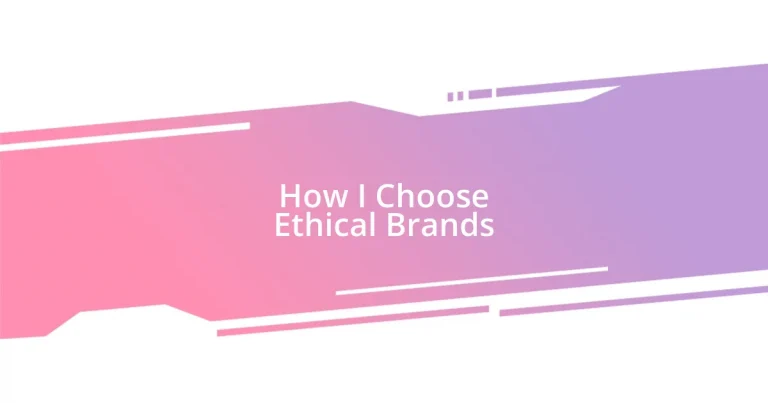Key takeaways:
- Understanding ethical brands involves evaluating their transparency, labor practices, and sustainability commitments to ensure personal values align with purchasing decisions.
- Researching brand values through certifications, consumer reviews, and company histories helps consumers navigate the authenticity and ethical claims of brands.
- Engaging with communities focused on ethical living enriches the journey, underscoring the collective responsibility for making informed, sustainable choices.
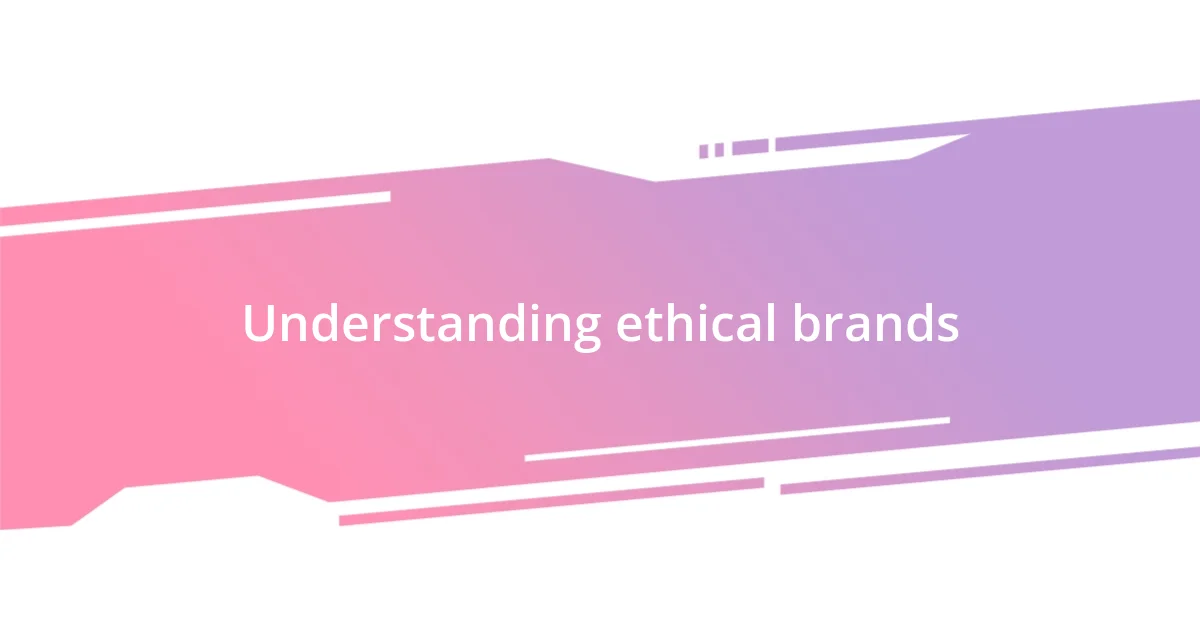
Understanding ethical brands
When I first began exploring ethical brands, I quickly realized that these companies often prioritize sustainability and social responsibility over mere profit. This approach resonates deeply with my values, as I believe that our purchasing power can contribute to positive change. Have you ever thought about how the brands we choose can impact the world around us?
Understanding ethical brands also means delving into their transparency practices. Many of them actively share information about their supply chains, labor practices, and environmental impact. I recall a time when I discovered a clothing company that not only highlighted fair wages for its workers but also used recycled materials. It felt refreshing to support a brand that reflected my commitment to ethical consumerism.
Moreover, it’s essential to recognize that ethical branding often encompasses a range of certifications and initiatives. Certifications like Fair Trade or B Corp provide reassurance about a brand’s practices. I often find myself feeling more connected to my purchases when I know they align with my values. Isn’t it reassuring to know that your favorite products support both people and the planet?
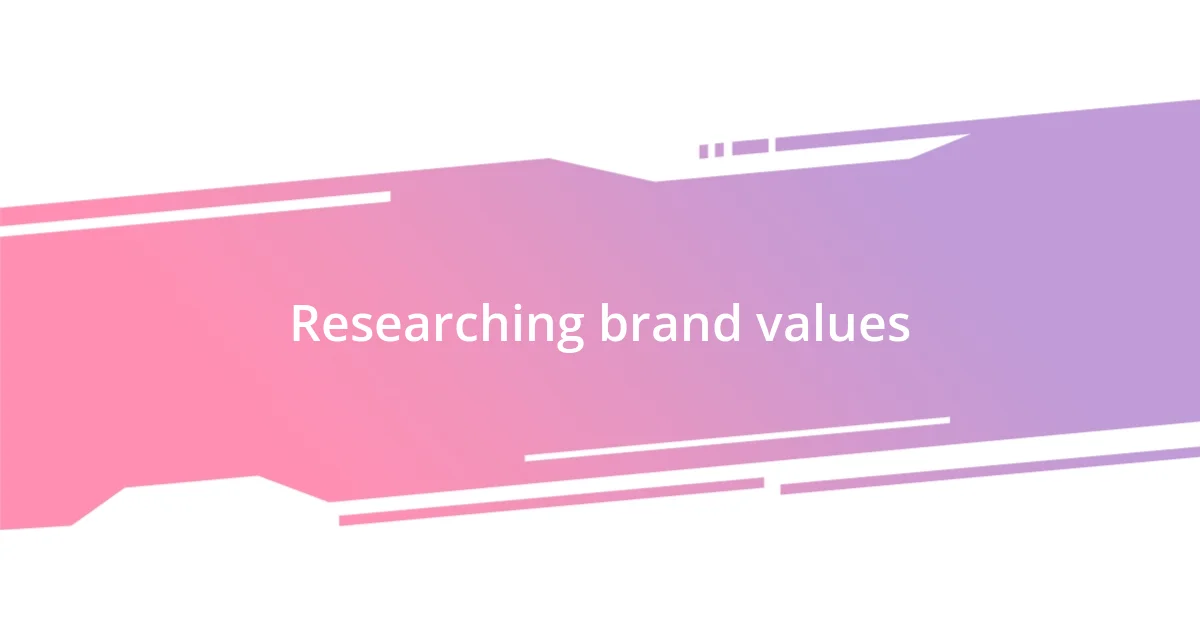
Researching brand values
Researching a brand’s values can be a revealing experience. I remember the time I stumbled upon a brand that claimed to support fair labor practices. But when I dug deeper, I found inconsistencies between their marketing and actual practices. It was a wake-up call, reminding me that understanding the core values of a brand is crucial for making informed choices.
In my journey, I’ve realized that not all brands communicate their values clearly. Some rely on buzzwords that sound appealing but lack substance. I believe it’s important to check for third-party validations like certifications or consumer reviews. When I discovered a skincare brand that was certified organic and cruelty-free, it filled me with a sense of trust. It affirmed my belief that responsible brands work hard to relay their genuine mission.
To further streamline my research, I often use comparison tables that break down different brands’ commitments. This allows me to see at a glance how various companies stack up against one another. If you’re wondering how to get started, consider creating your own simple table to compare key values and practices of brands you’re interested in.
| Brand Name | Key Values |
|---|---|
| Brand A | Sustainability, Fair Trade, Transparency |
| Brand B | Eco-friendly, Cruelty-free, Community Support |
| Brand C | Organic, Ethical Sourcing, Empowerment |
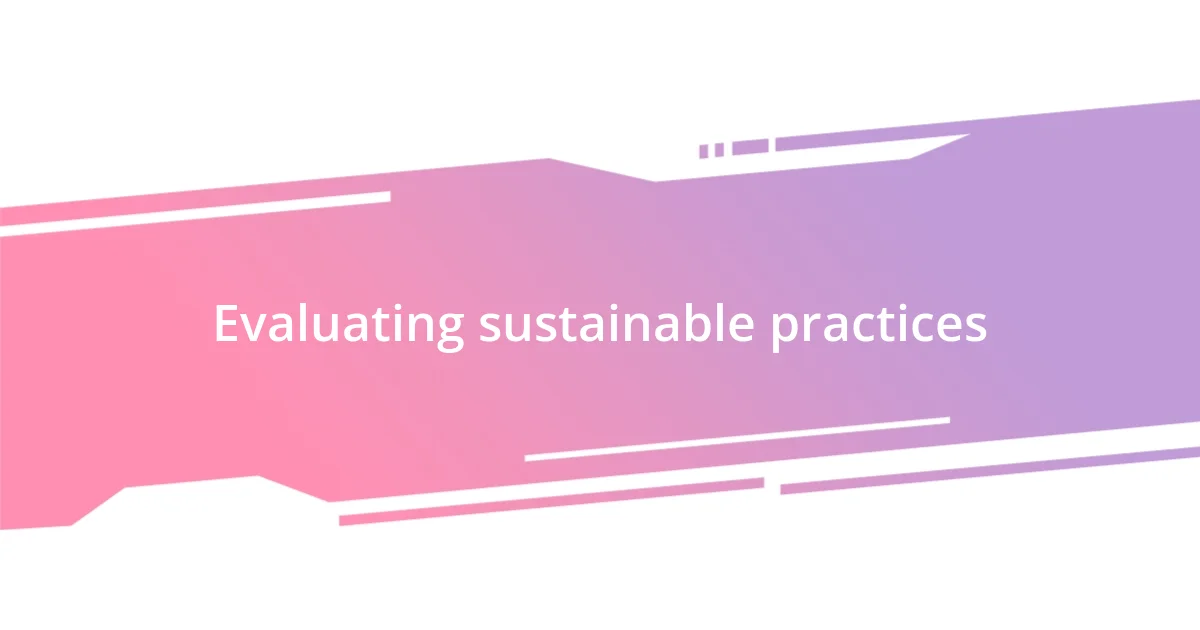
Evaluating sustainable practices
Evaluating sustainable practices can often feel overwhelming, yet it’s such a critical part of ensuring that our purchases align with our values. I remember the moment I first held a pair of shoes made from recycled materials. It wasn’t just about how they looked but the story behind them—each shoe represented not just a product but a commitment to reducing waste. I’ve learned that when evaluating brands, I look for clear evidence of their sustainable practices, such as their use of renewable energy, waste management strategies, and the sourcing of materials.
Here are some key indicators I consider:
- Use of recycled or upcycled materials
- Commitment to renewable energy sources
- Sustainable packaging practices
- Transparency in their supply chain
- Promotion of biodiversity through responsible sourcing
Every time I spot these markers, it feels like uncovering a hidden treasure—real proof that the brand truly walks the talk. I often feel more empowered to support those brands, knowing they’re contributing to a healthier planet.
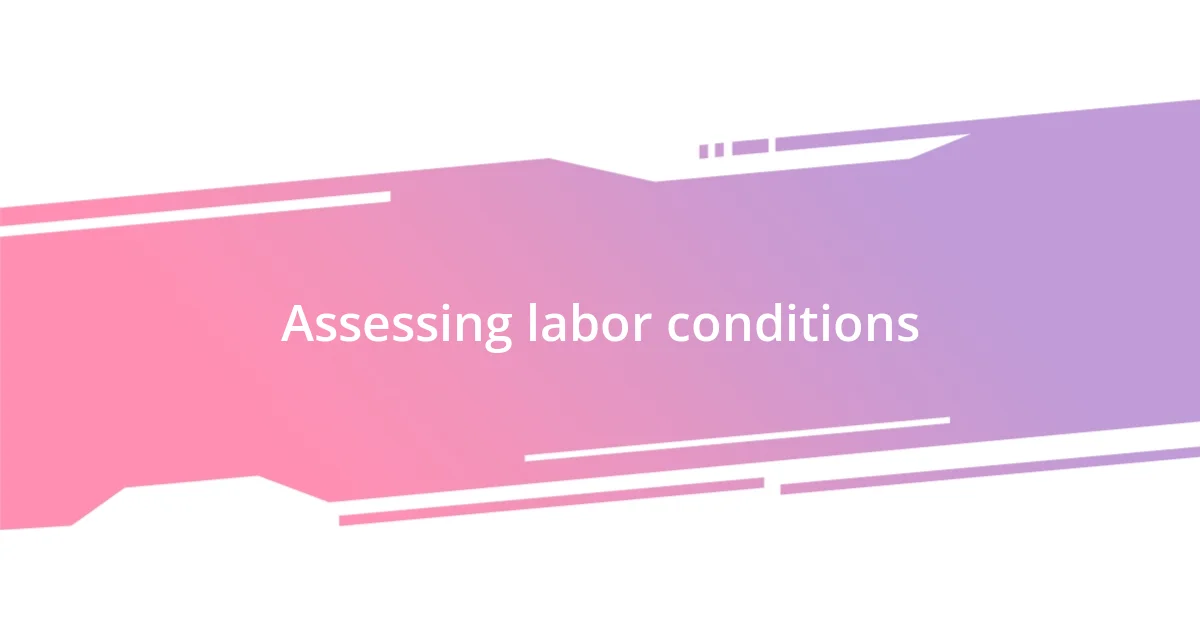
Assessing labor conditions
Assessing labor conditions is an essential step in my decision-making process. I vividly recall an experience when I first learned about brands that emphasized ethical labor practices. One time, during a visit to a local fair, I met artisans whose stories brought their products to life. Their pride in craftsmanship was palpable, and it made me appreciate the importance of fair wages and safe working environments. Isn’t it comforting to know that our choices can positively impact someone’s life?
As I dug deeper into various brands, I came across information about their labor practices tucked away in sustainability reports. I found it eye-opening to see how some companies actively engage in monitoring their supply chains to ensure decent working conditions. I’ve made it a habit to check for brands that publicly disclose their labor policies. It gives me a sense of security knowing that they’re committed to ensuring their workers are treated with respect and dignity. How many of us stop to think about the hands that create the goods we cherish?
Moreover, I often look for brands that encourage employee feedback and have systems in place for reporting grievances. For example, I once stumbled upon a clothing brand that ensured all their workers had access to confidential hotlines. This initiative showed me that they genuinely care about the well-being of their employees. When choosing brands, I feel empowered knowing my support can help foster a culture of accountability and respect in the workforce.
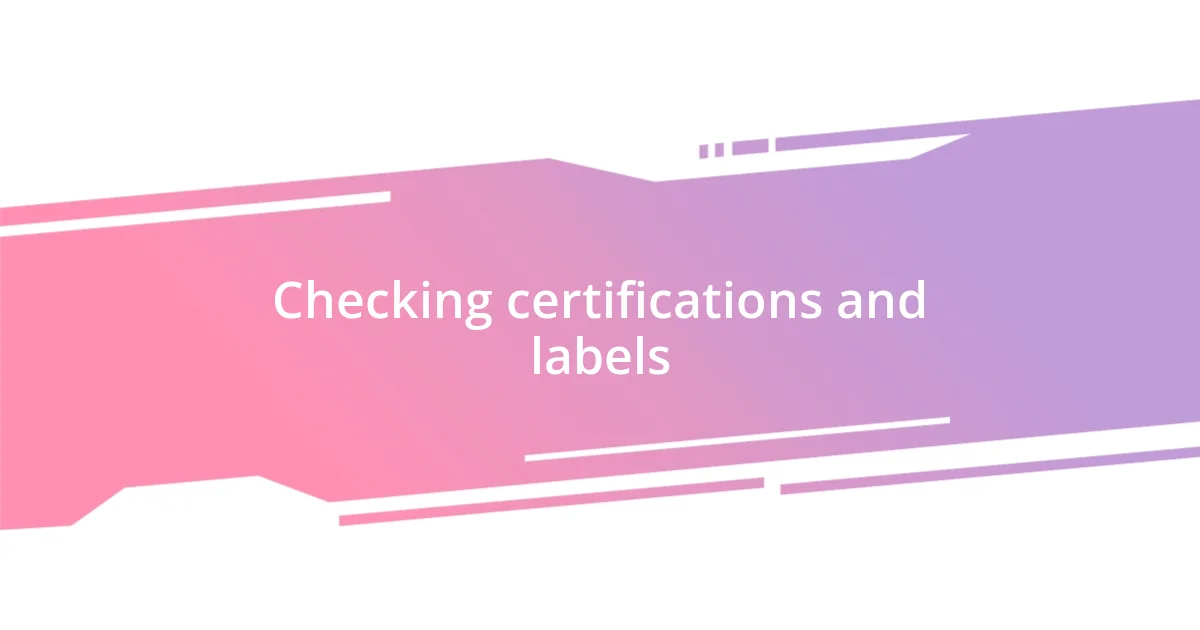
Checking certifications and labels
When I look for ethical brands, checking certifications and labels is like reading a badge of honor. The first time I noticed a Fair Trade label on a product, a sense of trust washed over me. It meant that the brand was committed to ensuring ethical sourcing and fair compensation for producers. Isn’t it reassuring to know that these labels can guide us in making informed choices?
As I dive deeper into certifications, I often spot labels like GOTS (Global Organic Textile Standard) on clothing. The moment I see that label, I feel a connection to the sustainable practices behind those fabrics. For example, one time, while shopping for organic cotton sheets, I found a brand boasting GOTS certification. It felt great to know the entire production process—from the farming to the stitching—met strict environmental and social criteria. How wonderful it is to find that kind of integrity in the products we use daily!
I’ve also learned to appreciate the importance of transparency within these labels. When I came across a skincare brand proudly displaying various certifications, I felt a wave of excitement. I dug into their website to learn more and discovered detailed explanations about each certification. It’s not just about having a label; it’s about what it represents. Isn’t it inspiring that a simple label can signify a wider commitment to ethical practices and help me support brands that align with my values?
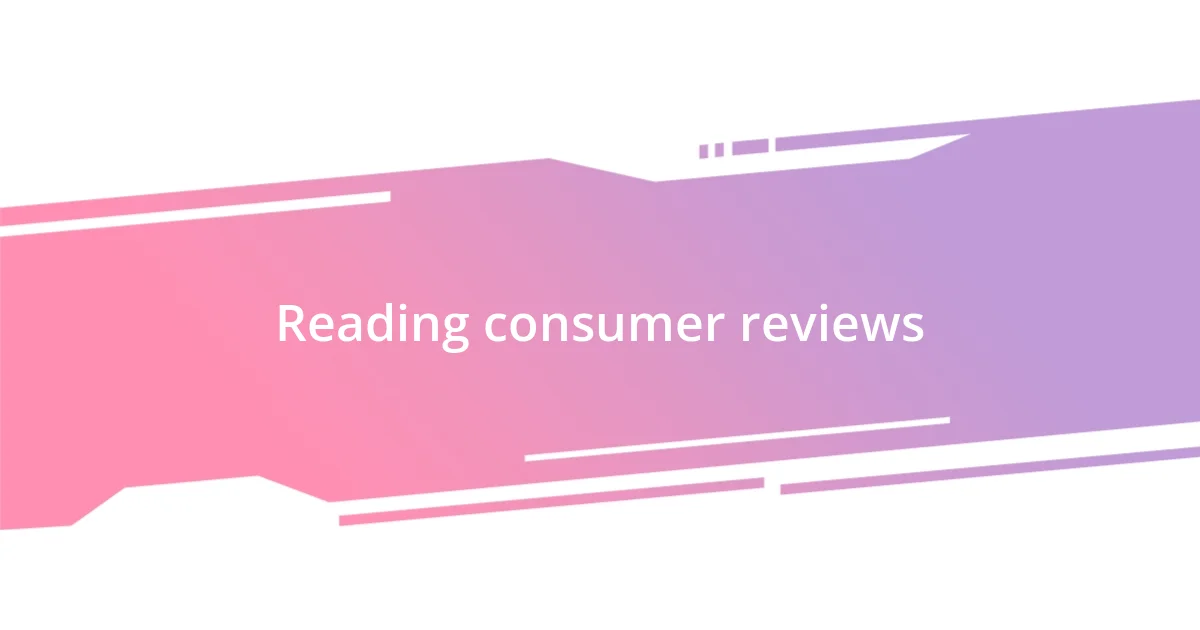
Reading consumer reviews
Reading consumer reviews has become a crucial part of my journey toward choosing ethical brands. I remember purchasing my first eco-conscious skincare product after reading passionate reviews from fellow users. Their experiences not only confirmed the product’s effectiveness but also revealed the brand’s commitment to sustainable practices. Isn’t it incredible how a well-written review can guide us to make meaningful choices?
When I skim reviews, I look for common themes that demonstrate a brand’s values in action. One time, I found myself drawn to a shoe company that received praise for its ethical sourcing and environmental initiatives. The numerous testimonials spoke of customers not just loving the product, but feeling proud of their purchase. Have you ever felt that flutter of delight when a brand aligns perfectly with your values based on what others say?
I also pay attention to critical reviews as they can offer insights that glowing ones might overlook. For instance, while researching a brand’s commitment to sustainability, I stumbled upon some negative feedback about their packaging practices. This prompted me to dig deeper. It really made me think—how can companies call themselves ethical if they overlook key details like packaging? Reading both sides gives me a fuller picture and reassures me that my choices reflect an informed perspective.
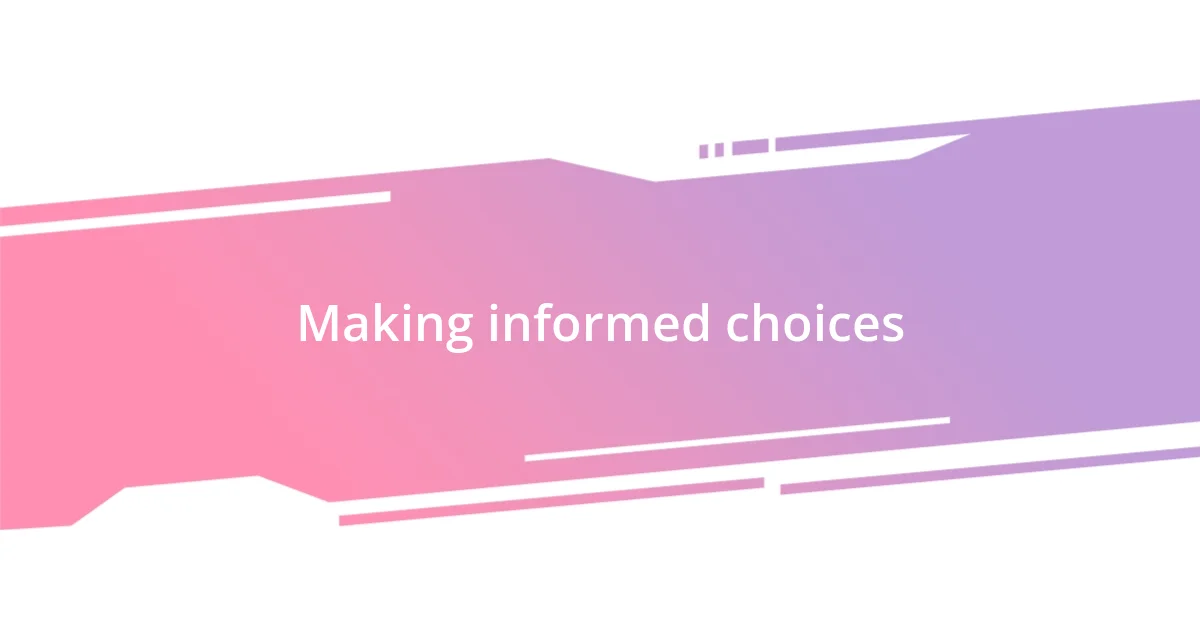
Making informed choices
Making informed choices often starts with a little research on the brands I’m considering. I remember the first time I Googled a clothing company before making a purchase. To my surprise, I stumbled upon a treasure trove of information about their labor practices and environmental efforts. How often do we realize that a quick search can reveal so much about a brand’s values? It made me appreciate the power of accessibility in our decision-making process.
Delving into a brand’s history helps me gauge their authenticity. I once came across a cosmetic line that touted its eco-friendliness, but digging deeper revealed a concerning past involving unethical labor practices. Suddenly, my excitement faded into disappointment. Isn’t it eye-opening how brand narratives can shift when we look beyond the surface? Finding that disconnect reaffirmed my commitment to aligning my purchases with trustworthy brands.
Additionally, I find it essential to engage with communities that prioritize ethical living. There was a time when I joined an online forum dedicated to sustainable lifestyles. The discussions on brand choices and their impacts opened my eyes to various perspectives, and ancient adages like “it takes a village” rang true. How valuable it is to learn from others who share similar values! It truly enriches my journey toward informed choices, reminding me that ethical shopping is not just a personal endeavor but a shared responsibility.












